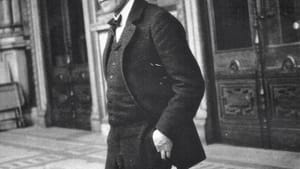Stay in the Loop
BSR publishes on a weekly schedule, with an email newsletter every Wednesday and Thursday morning. There’s no paywall, and subscribing is always free.
Mahler’s tortured world
Nézet-Séguin conducts Mahler (2nd review)

Why would a nice Jewish boy embrace the Resurrection?
First of all, Gustav Mahler was Jewish by heritage, not observance. And three years after the premiere of his Resurrection Symphony in 1894, Mahler converted to Catholicism, hoping he could escape anti-Semitism and further his conducting career.
But Mahler never embraced Catholic theology, and in his Resurrection Symphony he never referred to Christ. His resurrection was personal. Mahler was a tormented soul who hoped for a better life after death. His vision was encompassed in the text he chose for the symphony’s final movement:
“After a brief rest, Immortal life!/ You have not lived and suffered for nothing./ What was created must rise again.”
This sentiment reflects Mahler’s personal dream, yet it touches a nerve with listeners of all faiths — even agnostics.
You actually can find Jewish references in the symphony, which uses text reminiscent of the Yom Kippur prayer in which the decree on Judgment Day is announced by “a still small voice.” There’s also a place when the brass section alternates between fourths and fifths, almost like shofar blasts.
‘Three times homeless’
In Mahler’s time, his critics found even more Jewish traces in his music. “If Mahler’s music would speak Yiddish,” the anti-Semitic Rudolf Louis sneered, “it would be perhaps unintelligible to me. But it is repulsive to me because it acts Jewish. This is to say that it speaks musical German but with an accent, with an inflection, and above all, with the gestures of an Eastern, all too Eastern Jew.”
“Eastern Jew”? Mahler came from Bohemia, which is due north from Vienna. But Louis’s put-down typified the irrational type of prejudice that he encountered. “I am three times homeless,” Mahler once observed: “As a Czech among Austrians, an Austrian among Germans and a Jew anywhere in the world.”
Mahler expressed this feeling when he wrote about the scherzo of his Second Symphony: “Life becomes horrible, like the motion of dancing figures in a brightly-lit ballroom, into which you are peering from outside. The world seems distorted and mad. Utter disgust for all being and becoming seizes [you] in an iron grasp until [you] utter a cry of despair.”
In the symphony’s finale, Mahler created an alternate world for himself in which he and all of humanity receive forgiveness.
Wild extremes
The composer was an internally conflicted man of wild emotional extremes (Leonard Bernstein used to call him “a double man”), and Yannick Nézet-Séguin’s interpretation this month honored that conflict. From tremulous fear to shrieks of despair to childlike tenderness, the Orchestra emphasized Mahler’s moods. Instead of trying to fit the Mahler 2 into a rational whole, this performance brought out the acute dualities, the wide and wild extremes.
Starting with the intense, fierce attacks by the basses and cellos in the first movement, this was a dramatic trip through Mahler’s joy and pain, his hopes and fears, his search for the meaning of life.
Never have the Philadelphia brass sections sounded louder nor more sonorous. The finale achieved its intended impact with the ascending crescendi of chorus, organ, big orchestra, and offstage instruments. Angela Meade supplied angelic high notes, and Sarah Connolly added her rich mezzo to the poetic verses during Mahler’s last two movements.
The Westminster Symphonic Choir added its power to the finale. The night’s most impressive singing and playing, however, occurred not in the loud moments but in the hushed sections — something even harder to achieve.
To read another review by Robert Zaller, click here.
To read another review by Victor L. Schermer, click here.
What, When, Where
Philadelphia Orchestra: Mahler, Symphony No. 2 (“Resurrection”) in C minor. Angela Meade, soprano; Sarah Connolly, mezzo-soprano; Yannick Nézet-Séguin, conductor. With Westminster Symphonic Choir; Joe Miller, director. Oct. 30-Nov. 2, 2014 at Verizon Hall, Kimmel Center, Broad and Spruce Sts., Philadelphia. 215-893-1999 or www.philorch.org.
Sign up for our newsletter
All of the week's new articles, all in one place. Sign up for the free weekly BSR newsletters, and don't miss a conversation.
 Steve Cohen
Steve Cohen